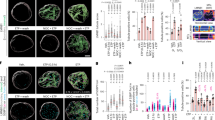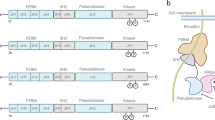Abstract
Skp2 (S-phase kinase-associated protein-2) SCF complex displays E3 ligase activity and oncogenic activity by regulating protein ubiquitination and degradation, in turn regulating cell cycle entry, senescence and tumorigenesis. The maintenance of the integrity of Skp2 SCF complex is critical for its E3 ligase activity. The Skp2 F-box protein is a rate-limiting step and key factor in this complex, which binds to its protein substrates and triggers ubiquitination and degradation of its substrates. Skp2 is found to be overexpressed in numerous human cancers, which has an important role in tumorigenesis. The molecular mechanism by which the function of Skp2 and Skp2 SCF complex is regulated remains largely unknown. Here we show that Foxo3a transcription factor is a novel and negative regulator of Skp2 SCF complex. Foxo3a is found to be a transcriptional repressor of Skp2 gene expression by directly binding to the Skp2 promoter, thereby inhibiting Skp2 protein expression. Surprisingly, we found for the first time that Foxo3a also displays a transcription-independent activity by directly interacting with Skp2 and disrupting Skp2 SCF complex formation, in turn inhibiting Skp2 SCF E3 ligase activity and promoting p27 stability. Finally, we show that the oncogenic activity of Skp2 is repressed by Foxo3a overexpression. Our results not only reveal novel insights into how Skp2 SCF complex is regulated, but also establish a new role for Foxo3a in tumor suppression through a transcription-dependent and independent manner.
This is a preview of subscription content, access via your institution
Access options
Subscribe to this journal
Receive 50 print issues and online access
$259.00 per year
only $5.18 per issue
Buy this article
- Purchase on Springer Link
- Instant access to full article PDF
Prices may be subject to local taxes which are calculated during checkout





Similar content being viewed by others
References
Chan CH, Lee SW, Wang J, Lin HK . Regulation of Skp2 expression and activity and its role in cancer progression. Sci World J 2010; 10: 1001–1015.
Nakayama KI, Nakayama K . Regulation of the cell cycle by SCF-type ubiquitin ligases. Semin Cell Dev Biol 2005; 16: 323–333.
Nakayama K, Nagahama H, Minamishima YA, Matsumoto M, Nakamichi I, Kitagawa K et al. Targeted disruption of Skp2 results in accumulation of cyclin E and p27(Kip1), polyploidy and centrosome overduplication. Embo J 2000; 19: 2069–2081.
Nakayama K, Nagahama H, Minamishima YA, Miyake S, Ishida N, Hatakeyama S et al. Skp2-mediated degradation of p27 regulates progression into mitosis. Dev Cell 2004; 6: 661–672.
Chan CH, Gao Y, Moten A, Lin HK . Novel ARF/p53-independent senescence pathways in cancer repression. J Mol Med 2011; 89: 857–867.
Chan CH, Lee SW, Li CF, Wang J, Yang WL, Wu CY et al. Deciphering the transcriptional complex critical for RhoA gene expression and cancer metastasis. Nat Cell Biol 2010; 12: 457–467.
Lin HK, Wang G, Chen Z, Teruya-Feldstein J, Liu Y, Chan CH et al. Phosphorylation-dependent regulation of cytosolic localization and oncogenic function of Skp2 by Akt/PKB. Nat Cell Biol 2009; 11: 420–432.
Lin HK, Chen Z, Wang G, Nardella C, Lee SW, Chan CH et al. Skp2 targeting suppresses tumorigenesis by Arf-p53-independent cellular senescence. Nature 2010; 464: 374–379.
Wang H, Bauzon F, Ji P, Xu X, Sun D, Locker J et al. Skp2 is required for survival of aberrantly proliferating Rb1-deficient cells and for tumorigenesis in Rb1+/− mice. Nat Genet 2010; 42: 83–88.
Bashir T, Dorrello NV, Amador V, Guardavaccaro D, Pagano M . Control of the SCF(Skp2-Cks1) ubiquitin ligase by the APC/C(Cdh1) ubiquitin ligase. Nature 2004; 428: 190–193.
Wei W, Ayad NG, Wan Y, Zhang GJ, Kirschner MW, Kaelin Jr WG . Degradation of the SCF component Skp2 in cell-cycle phase G1 by the anaphase-promoting complex. Nature 2004; 428: 194–198.
Dansen TB, Burgering BM . Unravelling the tumor-suppressive functions of FOXO proteins. Trends Cell Biol 2008; 18: 421–429.
Yang JY, Hung MC . A new fork for clinical application: targeting forkhead transcription factors in cancer. Clin Cancer Res 2009; 15: 752–757.
Hu MC, Lee DF, Xia W, Golfman LS, Ou-Yang F, Yang JY et al. IkappaB kinase promotes tumorigenesis through inhibition of forkhead FOXO3a. Cell 2004; 117: 225–237.
Yang JY, Zong CS, Xia W, Yamaguchi H, Ding Q, Xie X et al. ERK promotes tumorigenesis by inhibiting FOXO3a via MDM2-mediated degradation. Nat Cell Biol 2008; 10: 138–148.
Brunet A, Bonni A, Zigmond MJ, Lin MZ, Juo P, Hu LS et al. Akt promotes cell survival by phosphorylating and inhibiting a Forkhead transcription factor. Cell 1999; 96: 857–868.
Tran H, Brunet A, Grenier JM, Datta SR, Fornace Jr AJ, DiStefano PS et al. DNA repair pathway stimulated by the forkhead transcription factor FOXO3a through the Gadd45 protein. Science 2002; 296: 530–534.
Mamillapalli R, Gavrilova N, Mihaylova VT, Tsvetkov LM, Wu H, Zhang H et al. PTEN regulates the ubiquitin-dependent degradation of the CDK inhibitor p27(KIP1) through the ubiquitin E3 ligase SCF(SKP2). Curr Biol 2001; 11: 263–267.
Reichert M, Saur D, Hamacher R, Schmid RM, Schneider G . Phosphoinositide-3-kinase signaling controls S-phase kinase-associated protein 2 transcription via E2F1 in pancreatic ductal adenocarcinoma cells. Cancer Res 2007; 67: 4149–4156.
van Duijn PW, Trapman J . PI3K/Akt signaling regulates p27(kip1) expression via Skp2 in PC3 and DU145 prostate cancer cells, but is not a major factor in p27(kip1) regulation in LNCaP and PC346 cells. Prostate 2006; 66: 749–760.
Huang H, Regan KM, Wang F, Wang D, Smith DI, van Deursen JM et al. Skp2 inhibits FOXO1 in tumor suppression through ubiquitin-mediated degradation. Proc Natl Acad Sci U S A 2005; 102: 1649–1654.
Paik JH, Kollipara R, Chu G, Ji H, Xiao Y, Ding Z et al. FoxOs are lineage-restricted redundant tumor suppressors and regulate endothelial cell homeostasis. Cell 2007; 128: 309–323.
Zhang L, Wang C . F-box protein Skp2: a novel transcriptional target of E2F. Oncogene 2006; 25: 2615–2627.
Barre B, Perkins ND . A cell cycle regulatory network controlling NF-kappaB subunit activity and function. Embo J 2007; 26: 4841–4855.
Schneider G, Saur D, Siveke JT, Fritsch R, Greten FR, Schmid RM . IKKalpha controls p52/RelB at the skp2 gene promoter to regulate G1- to S-phase progression. Embo J 2006; 25: 3801–3812.
Appleman LJ, Chernova I, Li L, Boussiotis VA . CD28 costimulation mediates transcription of SKP2 and CKS1, the substrate recognition components of SCFSkp2 ubiquitin ligase that leads p27kip1 to degradation. Cell Cycle 2006; 5: 2123–2129.
Sarmento LM, Huang H, Limon A, Gordon W, Fernandes J, Tavares MJ et al. Notch1 modulates timing of G1-S progression by inducing SKP2 transcription and p27 Kip1 degradation. J Exp Med 2005; 202: 157–168.
Imaki H, Nakayama K, Delehouzee S, Handa H, Kitagawa M, Kamura T et al. Cell cycle-dependent regulation of the Skp2 promoter by GA-binding protein. Cancer Res 2003; 63: 4607–4613.
Wang IC, Chen YJ, Hughes D, Petrovic V, Major ML, Park HJ et al. Forkhead box M1 regulates the transcriptional network of genes essential for mitotic progression and genes encoding the SCF (Skp2-Cks1) ubiquitin ligase. Mol Cell Biol 2005; 25: 10875–10894.
Zuo T, Liu R, Zhang H, Chang X, Liu Y, Wang L et al. FOXP3 is a novel transcriptional repressor for the breast cancer oncogene SKP2. J Clin Invest 2007; 117: 3765–3773.
Bloom J, Pagano M . Deregulated degradation of the cdk inhibitor p27 and malignant transformation. Semin Cancer Biol 2003; 13: 41–47.
Liu J, Furukawa M, Matsumoto T, Xiong Y . NEDD8 modification of CUL1 dissociates p120(CAND1), an inhibitor of CUL1-SKP1 binding and SCF ligases. Mol Cell 2002; 10: 1511–1518.
Zheng J, Yang X, Harrell JM, Ryzhikov S, Shim EH, Lykke-Andersen K et al. CAND1 binds to unneddylated CUL1 and regulates the formation of SCF ubiquitin E3 ligase complex. Mol Cell 2002; 10: 1519–1526.
Jonason JH, Gavrilova N, Wu M, Zhang H, Sun H . Regulation of SCF(SKP2) ubiquitin E3 ligase assembly and p27(KIP1) proteolysis by the PTEN pathway and cyclin D1. Cell Cycle 2007; 6: 951–961.
Gao D, Inuzuka H, Tseng A, Chin RY, Toker A, Wei W . Phosphorylation by Akt1 promotes cytoplasmic localization of Skp2 and impairs APCCdh1-mediated Skp2 destruction. Nat Cell Biol 2009; 11: 397–408.
Wang F, Chan CH, Chen K, Guan X, Lin HK, Tong Q . Deacetylation of FOXO3 by SIRT1 or SIRT2 leads to Skp2-mediated FOXO3 ubiquitination and degradation. Oncogene 2012; 31: 1546–1557.
Majumder PK, Grisanzio C, O’Connell F, Barry M, Brito JM, Xu Q et al. A prostatic intraepithelial neoplasia-dependent p27 Kip1 checkpoint induces senescence and inhibits cell proliferation and cancer progression. Cancer Cell 2008; 14: 146–155.
Young AP, Schlisio S, Minamishima YA, Zhang Q, Li L, Grisanzio C et al. VHL loss actuates a HIF-independent senescence programme mediated by Rb and p400. Nat Cell Biol 2008; 10: 361–369.
Chu IM, Hengst L, Slingerland JM . The Cdk inhibitor p27 in human cancer: prognostic potential and relevance to anticancer therapy. Nat Rev Cancer 2008; 8: 253–267.
Hershko DD . Oncogenic properties and prognostic implications of the ubiquitin ligase Skp2 in cancer. Cancer 2008; 112: 1415–1424.
Sicinski P, Zacharek S, Kim C . Duality of p27Kip1 function in tumorigenesis. Genes Dev 2007; 21: 1703–1706.
Medema RH, Kops GJ, Bos JL, Burgering BM . AFX-like Forkhead transcription factors mediate cell-cycle regulation by Ras and PKB through p27kip1. Nature 2000; 404: 782–787.
Lin HK, Bergmann S, Pandolfi PP . Cytoplasmic PML function in TGF-beta signalling. Nature 2004; 431: 205–211.
Yang WL, Wang J, Chan CH, Lee SW, Campos AD, Lamothe B et al. The E3 ligase TRAF6 regulates Akt ubiquitination and activation. Science 2009; 325: 1134–1138.
Acknowledgements
We thank Drs ME Greenberg, WR Sellers, VA Boussiotis and D Bohmann for providing the reagents. We are grateful to Dr Lin’s lab members for their insightful comments and suggestions. We extend our special thanks to S Zhang and Dr Z Han for their technical support. This work was supported by the MD Anderson Trust Scholar Fund, the National Cancer Institute's Prostate Cancer Specialized Program of Research Excellence (SPORE) development grant at the MD Anderson Cancer Center, NIH RO1 grants, CPRIT grant, and DOD New Investigator Award to HKL.
Author information
Authors and Affiliations
Corresponding author
Ethics declarations
Competing interests
The authors declare no conflict of interest.
Rights and permissions
About this article
Cite this article
Wu, J., Lee, SW., Zhang, X. et al. Foxo3a transcription factor is a negative regulator of Skp2 and Skp2 SCF complex. Oncogene 32, 78–85 (2013). https://doi.org/10.1038/onc.2012.26
Received:
Revised:
Accepted:
Published:
Issue Date:
DOI: https://doi.org/10.1038/onc.2012.26
Keywords
This article is cited by
-
Linc-SCRG1 accelerates progression of hepatocellular carcinoma as a ceRNA of miR26a to derepress SKP2
Journal of Experimental & Clinical Cancer Research (2021)
-
Phosphorylation by mTORC1 stablizes Skp2 and regulates its oncogenic function in gastric cancer
Molecular Cancer (2017)
-
LXR activation causes G1/S arrest through inhibiting SKP2 expression in MIN6 pancreatic beta cells
Endocrine (2016)
-
Genetic inactivation of the pancreatitis-inducible gene Nupr1 impairs PanIN formation by modulating KrasG12D-induced senescence
Cell Death & Differentiation (2014)



